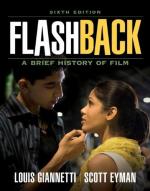
|
| Name: _________________________ | Period: ___________________ |
This quiz consists of 5 multiple choice and 5 short answer questions through Flashback: A Brief History of Film Chapters 13-16.
Multiple Choice Questions
1. Which of the following directors was not one the greats in 1940s Italy?
(a) Cesare Zavattini.
(b) Roberto Rossellini.
(c) Vittorio de Sica.
(d) Vincent Minnelli.
2. What film helped open up the world to the power of British filmmaking in the 1930s?
(a) "Rebecca."
(b) "The Private Life of Henry VIII."
(c) "Strangers on a Train."
(d) "The Once and Future King."
3. Which of the following was not one of the major national movements in America during the 1970s?
(a) Nationalism.
(b) Populism.
(c) Marxism.
(d) Feminism.
4. Which of the following was not one of the most popular genres to emerge from Japan's film industry?
(a) Science fiction.
(b) Samurai films.
(c) Historical romance.
(d) Animation.
5. In France's New Wave, filmmakers experimented with mixing _____.
(a) Languages.
(b) Location shoots.
(c) Scripts.
(d) Genres.
Short Answer Questions
1. What was significant about cinema in education in the 1970s?
2. What became the new standard screen ratio for films in the 1950s?
3. In what year did the stock market crash in America, causing film investors to pull out of Hollywood?
4. What British comedy troupe had a cinematic bright spot for their country's struggling film industry?
5. What region became renowned for their film adaptations of literary classics?
|
This section contains 231 words (approx. 1 page at 300 words per page) |

|




